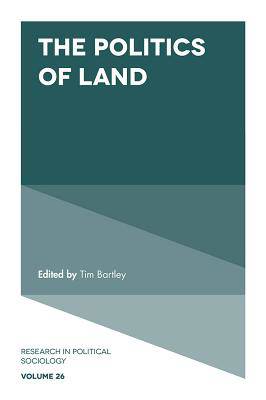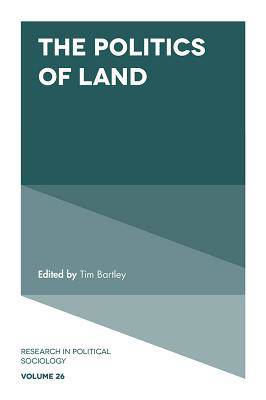
Bedankt voor het vertrouwen het afgelopen jaar! Om jou te bedanken bieden we GRATIS verzending (in België) aan op alles gedurende de hele maand januari.
- Afhalen na 1 uur in een winkel met voorraad
- In januari gratis thuislevering in België
- Ruim aanbod met 7 miljoen producten
Bedankt voor het vertrouwen het afgelopen jaar! Om jou te bedanken bieden we GRATIS verzending (in België) aan op alles gedurende de hele maand januari.
- Afhalen na 1 uur in een winkel met voorraad
- In januari gratis thuislevering in België
- Ruim aanbod met 7 miljoen producten
Zoeken
The Politics of Land
€ 223,95
+ 447 punten
Omschrijving
The politics of land are vital. They stretch from fights over fracking, gentrification, and taxation to land grabs, dispossession, and border conflicts. And they raise crucial questions about power, authority, violence, populism, and neoliberalism. This volume of Research in Political Sociology seeks to carve out a renewed political sociology of land, bringing together classic questions about the state, commodification, and social change and contemporary studies of contentious land use in various parts of the world.
An introductory essay sketches foundations for a political sociology of land and specifies what is unique about land in comparison to other political objects. Chapters are based on highly original qualitative, quantitative, and/or historical analyses to shed light on numerous dimensions of land politics. They include analyses of anti-fracking campaigns, property tax caps, and "green gentrification" in the United States, soil protection regulation in Europe, squatter settlements in Peru, land grabs in peri-urban China and rural Senegal, violent expulsions in Colombia, and the privatization of property rights in Morocco. The volume brings together high quality, peer-reviewed research, opens up novel comparisons, and enriches theories of the state, commodification, and collective resistance.
An introductory essay sketches foundations for a political sociology of land and specifies what is unique about land in comparison to other political objects. Chapters are based on highly original qualitative, quantitative, and/or historical analyses to shed light on numerous dimensions of land politics. They include analyses of anti-fracking campaigns, property tax caps, and "green gentrification" in the United States, soil protection regulation in Europe, squatter settlements in Peru, land grabs in peri-urban China and rural Senegal, violent expulsions in Colombia, and the privatization of property rights in Morocco. The volume brings together high quality, peer-reviewed research, opens up novel comparisons, and enriches theories of the state, commodification, and collective resistance.
Specificaties
Betrokkenen
- Uitgeverij:
Inhoud
- Aantal bladzijden:
- 288
- Taal:
- Engels
- Reeks:
- Reeksnummer:
- nr. 26
Eigenschappen
- Productcode (EAN):
- 9781787564282
- Verschijningsdatum:
- 13/03/2019
- Uitvoering:
- Hardcover
- Formaat:
- Genaaid
- Afmetingen:
- 155 mm x 231 mm
- Gewicht:
- 476 g

Alleen bij Standaard Boekhandel
+ 447 punten op je klantenkaart van Standaard Boekhandel
Beoordelingen
We publiceren alleen reviews die voldoen aan de voorwaarden voor reviews. Bekijk onze voorwaarden voor reviews.








